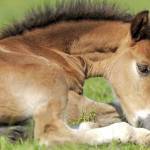Does Separation from a Young Foal Affect Mare Fertility?

When mares are bred soon after a foal is born, they often must be transported to the farm where the stallion is kept. Taking the new foal along is risky because of the chance of injury, but separating the mare and foal causes some distress for both horses. To find out whether separation and transport affected the mare’s fertility, researchers* in Queensland, Australia analyzed the breeding records from three commercial Thoroughbred farms during two breeding seasons.
Mares were sorted into three groups: neither transported nor separated at the time of breeding, transported but not separated because the foal was taken along to the breeding site, or both separated and transported. Pregnancy rates from the breeding were compared among the groups.
Rates were slightly higher for mares that were not transported or separated, but the difference was not significant. When other factors were considered for the mares (history of not becoming pregnant, delivering a dead foal, or experiencing loss of early pregnancies), these was a slightly lower rate of pregnancy but the difference was again not significant.
In this study, results did not indicate a detrimental effect of transportation or separation of mare and foal for the brief time involved in breeding.
*“Effect of transport and separation from foal on mare fertility at first post-foaling service,” was presented at the 2006 Australian Equine Science Symposium.








